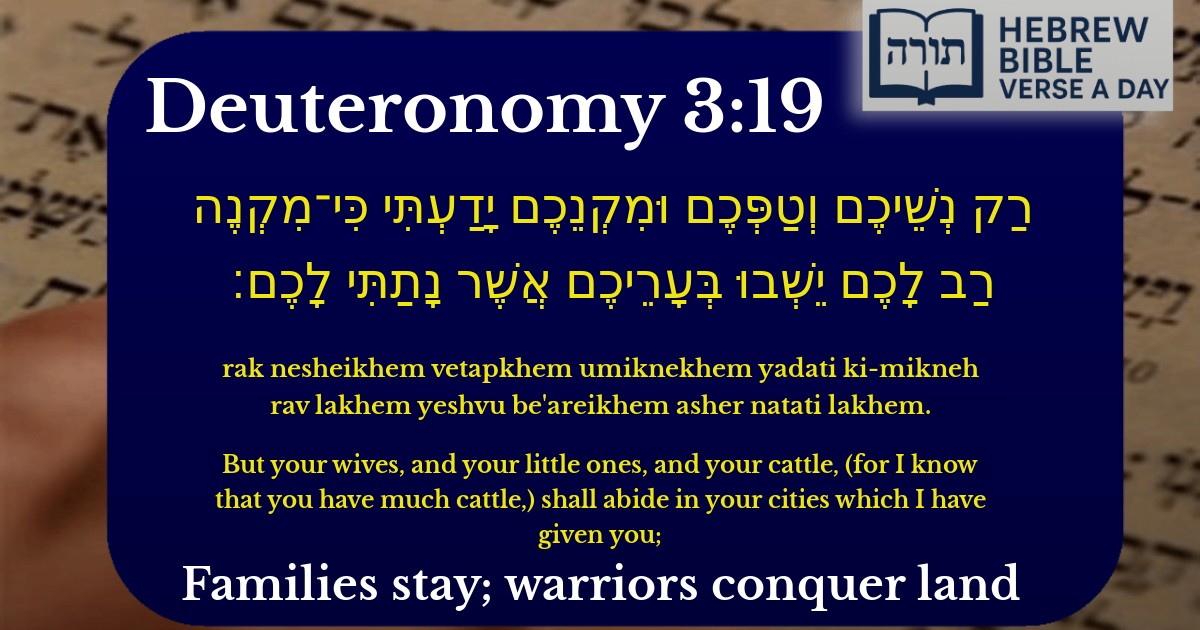Join Our Newsletter To Be Informed When New Videos Are Posted
Join the thousands of fellow Studends who rely on our videos to learn how to read the bible in Hebrew for free!
Hebrew Text
רַק נְשֵׁיכֶם וְטַפְּכֶם וּמִקְנֵכֶם יָדַעְתִּי כִּי־מִקְנֶה רַב לָכֶם יֵשְׁבוּ בְּעָרֵיכֶם אֲשֶׁר נָתַתִּי לָכֶם׃
English Translation
But your wives, and your little ones, and your cattle, (for I know that you have much cattle,) shall abide in your cities which I have given you;
Transliteration
Rak nesheikhem vetapkhem umiknekhem yadati ki-mikneh rav lakhem yeshvu be'areikhem asher natati lakhem.
Hebrew Leining Text
רַ֠ק נְשֵׁיכֶ֣ם וְטַפְּכֶם֮ וּמִקְנֵכֶם֒ יָדַ֕עְתִּי כִּֽי־מִקְנֶ֥ה רַ֖ב לָכֶ֑ם יֵֽשְׁבוּ֙ בְּעָ֣רֵיכֶ֔ם אֲשֶׁ֥ר נָתַ֖תִּי לָכֶֽם׃
רַ֠ק נְשֵׁיכֶ֣ם וְטַפְּכֶם֮ וּמִקְנֵכֶם֒ יָדַ֕עְתִּי כִּֽי־מִקְנֶ֥ה רַ֖ב לָכֶ֑ם יֵֽשְׁבוּ֙ בְּעָ֣רֵיכֶ֔ם אֲשֶׁ֥ר נָתַ֖תִּי לָכֶֽם׃
🎵 Listen to leining
Parasha Commentary
📚 Talmud Citations
This verse is not quoted in the Talmud.


Context of the Verse
This verse (Devarim 3:19) is part of Moshe Rabbeinu's speech to Bnei Yisrael before they enter Eretz Yisrael. Moshe recounts how he instructed the tribes of Reuven, Gad, and half of Menashe to leave their families and livestock in the cities east of the Jordan while the men would join the rest of Bnei Yisrael in conquering the land.
Rashi's Explanation
Rashi (Devarim 3:19) explains that Moshe assured these tribes that their families and livestock would remain secure in the fortified cities they had already captured. The phrase "כִּי־מִקְנֶה רַב לָכֶם" ("for I know that you have much cattle") emphasizes that their abundant livestock was a valid reason for them to settle in the Transjordan region, which was suitable for grazing.
Rambam's Perspective
Rambam (Hilchot Melachim 7:11) discusses the halachic implications of this arrangement, noting that the obligation to participate in milchemet mitzvah (obligatory wars) takes precedence over personal concerns. However, in this case, Hashem permitted the tribes to temporarily leave their families behind due to the necessity of settling the land properly.
Midrashic Insights
Halachic Considerations
The Kli Yakar (Devarim 3:19) notes that the mention of cattle before the cities ("מִקְנֵכֶם... בְּעָרֵיכֶם") teaches that their primary concern was their livestock, which required proper grazing land. This reflects the Torah's recognition of practical economic needs while ensuring the fulfillment of national obligations.